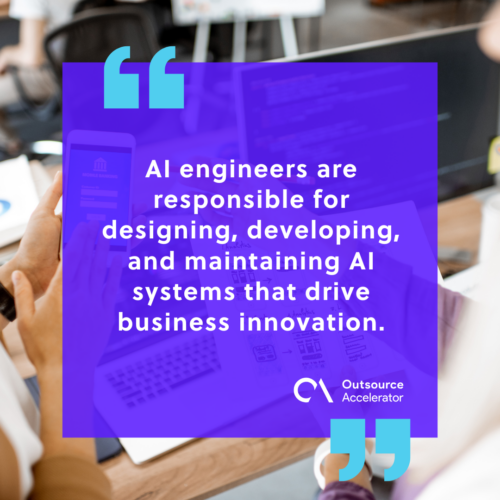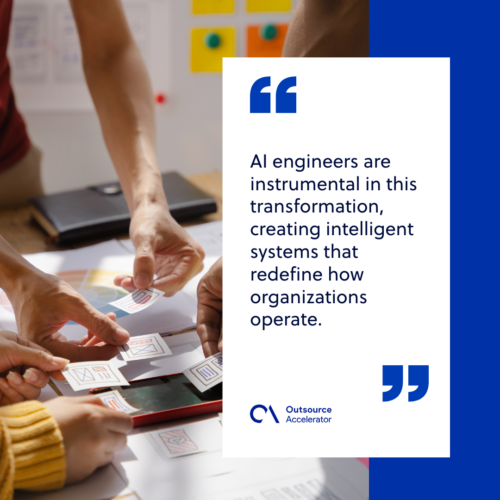How an AI engineer shapes the workforce of tomorrow

AI is changing how businesses function, reinventing the workforce, and revolutionizing entire industries. As AI-driven automation becomes more prevalent, AI engineers are at the forefront, developing technologies that enhance efficiency, productivity, and innovation.
These professionals play a crucial role in shaping the future of work, ensuring AI is leveraged effectively to augment human capabilities rather than replace them.
AI’s growing role in the workforce
The integration of AI across industries is no longer a futuristic concept, but a reality reshaping global markets. From healthcare and finance to manufacturing and customer service, AI is streamlining operations, optimizing decision-making, and enhancing user experiences.
Businesses are increasingly relying on AI-powered tools for data analysis, predictive modeling, and intelligent automation. The shift has led to the creation of new job roles and the evolution of existing ones.
While AI adoption presents challenges, it also unlocks unprecedented opportunities for workforce transformation, making AI engineers indispensable in the modern economy.
What does an AI engineer do?
AI engineers are responsible for designing, developing, and maintaining AI systems that drive business innovation. Their expertise extends across multiple disciplines, including machine learning, deep learning, data science, and software engineering.

Here are seven key roles AI engineers play in shaping the workforce of tomorrow:
1. Developing AI-powered automation
AI engineers design algorithms that automate repetitive and time-consuming tasks, increasing efficiency and reducing human error.
In industries such as finance and customer support, AI-powered chatbots and robotic process automation (RPA) systems handle routine inquiries and transactions. This allows human workers to redirect their focus towards more complex and creative tasks.
2. Enhancing data-driven decision-making
Businesses rely on vast amounts of data to make informed decisions. AI engineers build machine learning models that analyze data patterns, providing actionable insights for strategic planning.
In sectors like healthcare, AI-driven diagnostic tools assist doctors in identifying diseases more accurately, leading to better patient outcomes.
3. Personalizing user experiences
AI engineers develop recommendation engines that tailor content and services based on user behavior.
From personalized shopping suggestions in e-commerce to customized learning programs in education, AI enhances user engagement and satisfaction. An IBM consumer survey even found that 3 in 5 consumers were interested in using AI.
These intelligent systems refine their recommendations over time, continuously improving the user experience.
4. Advancing Natural Language Processing (NLP)
The ability of AI to understand and generate human language is a game-changer in communication. AI engineers work on NLP technologies that power voice assistants, real-time language translation, and sentiment analysis.
This innovation improves accessibility and efficiency in customer interactions, making AI an integral part of modern business communication.
5. Strengthening cybersecurity and fraud detection
With cyber threats on the rise, AI engineers develop security solutions that detect anomalies and prevent fraud.
AI-powered cybersecurity tools analyze network behavior, identify suspicious activities, and respond to threats in real-time. This proactive approach helps protect businesses from data breaches and financial losses.
6. Optimizing supply chain and logistics
AI is transforming logistics by predicting demand, optimizing routes, and managing inventory efficiently. AI engineers design systems that streamline supply chain operations, reducing costs and improving delivery times.
Companies in e-commerce and manufacturing benefit from AI-driven demand forecasting, ensuring seamless production and distribution.
7. Driving AI ethics and responsible AI development
As AI adoption grows, ethical concerns regarding bias, transparency, and accountability must be addressed.
AI engineers play a critical role in developing fair and responsible AI systems, ensuring that AI models are unbiased and aligned with ethical standards. Their work fosters trust in AI technologies and promotes sustainable AI adoption across industries.
Embrace AI as a tool for progress
AI is not a replacement for human intelligence but a powerful tool that enhances workforce capabilities. Businesses that embrace AI-driven solutions gain a competitive edge by improving efficiency, innovation, and customer experiences.
AI engineers are instrumental in this transformation, creating intelligent systems that redefine how organizations operate.

For companies looking to leverage AI expertise, hiring skilled AI engineers is crucial. If your business seeks AI-driven solutions to stay ahead in the digital era, consider partnering with experienced AI engineers through Outsourced.
Hiring AI engineers from Outsourced offers distinct advantages, including:
- Data-driven decision-making
- Improved customer engagement and satisfaction through AI tools like chatbots
- Automation of repetitive tasks for heightened operational efficiency
- Innovation in new AI-integrated products and services
- Bolstering cybersecurity measures using AI
Outsourced specializes in connecting businesses with the top 1% of offshore remote talent in the Philippines. This ensures that organizations find the perfect fit for their AI engineering needs and have the flexibility to scale up to a full team of AI professionals as their business expands.
By integrating AI into your operations, you can drive sustainable growth and position your workforce for the future.







 Independent
Independent




